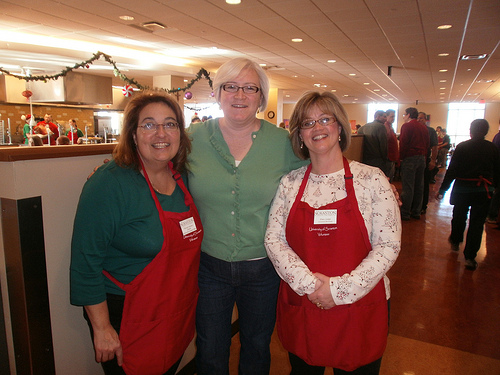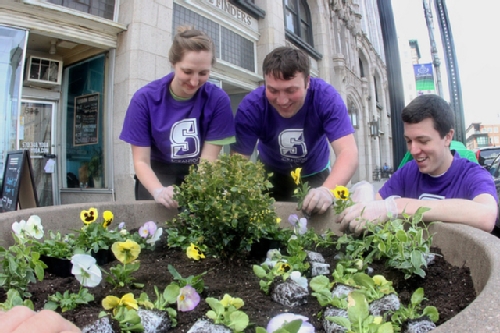Cura Personalis

A Community of Service
A commitment to service is a central to our mission as Catholic, Jesuit university. Students, faculty, and staff take part in a host of mission-related activities each year; for students, service learning continues to form a key component of their education. In 2011-12, 1,316 students completed over 18,000 service learning hours through the Panuska College of Professional Studies. Over 2,800 students - nearly half of the University's total enrollment - took part in 170,000 hours of service activities to local agencies during the past year; 70 participated in alternative spring breaks, working with and for others in need across the country. Nine students were named Scholars in Service to Pennsylvania by AmeriCorps. Seventy-six students participated in international services trips to nations such as Ecuador, Haiti, and Guyana; 18 of our faculty and staff served as mentors for this student experience. In addition to these faculty and staff mentoring experiences, 79 staff took part in an expanded Mission & Service Leave program.
A new online system developed by the Office of Community Relations allows faculty and staff to record and submit service hours at any time, allowing the University to more accurately collect and share information about the good work done throughout the year. Part of the Office's work this past year has been the launch of the Downtown Engagement Initiative, a program designed to increase awareness and collaboration between campus constituencies and downtown offerings and events. The initiative's events and programs drew over 1,700 students, faculty, staff and parents into the downtown Scranton area.

Centers for Engagement
This year, the University’s opened the new Jesuit Center at the University of Scranton. As described by Fr. Kevin Quinn, president of the University, the Center will play a central role in the life of the University community, serving as a resource to “engage faculty and staff in our mission and will help to keep our Catholic and Jesuit identity at the core of our work together,” further expanding the Jesuit-lay parnterships that are essential to the continuity of Jesuit higher education. The Center will directly further one of the goals of our strategic plan, which seeks to provide faculty and staff, especially those that are new to our community, with opportunities to help them understand and appreciate the sacred and centuries old work of Catholic and Jesuit education.
The Panuska College of Professoinal Studies' Leahy Community Health and Family Center has been become a part of the University that serves not only those in need within the city of Scranton and surrounding communities, but an venue for direct, interdisciplinary experience for PCPS students to learn and to serve. Gaining understanding about intercultural issues in health care and understanding the needs of the marginalized form an important part of this experience. In 2011-12, the Center's clinic had over 1700 patient visits; services offered include a number of educational programs and community projects, a physical therapy clinic, counseling clinic, medical clinic for the uninsured, smoking cessation and anti-shoplifting group sessions, and the Peacemaker's After School Program. Over 1400 University student service hours were logged in the Center, and several academic programs use the center for experiential education for students, including pre-med majors at the University, and medical students at the local Commonwealth Medical College. The Center will play a direct role in the new TAPESTRY program in the Panuska College. The Center received outside grants and foundation funding totaling over $173,000 in 2011-12, including a $10,000 grant from Blue Cross of Northeastern Pennsylvania's Blue Ribbon Foundation in support of the Center's Clinic for the Uninsured. The University also received a $25,000 grant from Wells Fargo to help fund the University's University of Success program, a multi-year, pre-college program for high school students who wish to develop the skills that will help get them into - and be successful in - college.
The University's Small Business Development Center (SBDC) continues to provide exceptional services to members of (and those wishing to join) the region's small business community. The SBDC provides educational programs and no cost, confidential consulting services to entrepreneurs looking to start of grow a small business. The SBDC recently relocated its offices to a downtown Scranton facility, making it more easily accessible to those seeking its services, and closer in proximity to local partner agencies. A recent partnership with Penn College has created an additional SBDC location. In 2011-12, the SBDC facilitated more than 30 educational programs, and served 826 clients in its eight-county service area, resulting in the start of 91 new businesses, 172 new jobs, and over $6.4 million dollars in secured funding for its clients. The SBDC, in partnership with the Kania School of Management, provides University students a hands-on learning opportunity through its Women's Entrepreneurship Center; six University students completed 160-hour internships through the Center this past year.
Care for the Whole Person
Building connections between learning that happens inside and outside of the classroom is a central theme in Jesuit higher education. Living/learning communities are one way we seek to explore this theme. The FIRE (Focusing on Initiative, Responsibility and Engagement) Living Learning Community was developed as a leadership program for first-year students in 2011. In collaboration with the Center for Student Engagement, this residential experience offered thirty-seven (37) residents the opportunity to define goals, connect with University resources, and participate in leadership development. This past year, the Cura Personalis (CP) Living Learning program focused on Faith, Service, and Justice pilars with the support of the Office of Campus Ministry and the University’s Theology department; forty-eight first-year resident students participated in this community. Reaching out to non-residential students is a key goal for the Student Affairs services areas, and this past year, commuter students were recruited to participate in the CP Living Learning program, taking part in the academic Theology course component of the program and being named a Commuter in Residence for the residence hall.
This past year, the new Office of Off Campus and Commuter Student Affairs (OCCSA) began its work. Designed to provide focus to University efforts to serve non-residential students, in a very successful first year, the Office guided the formation of several new programs and initiatives, including the development of the Commuter Student Association and the revitalization of the Off-Campus Advisory Board.
In 2011-12, the Jane Kopas Women's Center committed to expanding its PACT (Promoting Awareness of the College Transition) Program by engaging more student peer facilitators and faculty and staff in the program. In fall 2011, the number of student facilitators increased by 50% from the prior fall, from 21 to 42 students. Of this number, 13 were members of the graduate Counseling and Human Services department. Half of the faculty/staff facilitators taking part in this year's program were new participants in 2011. To continue to support the growth of this program, the PACT Steering Committee was formed, establishing a stronger connection between Student Affairs staff and the University's Counseling Training Center.
The opening and dedication of Pilarz Hall in fall 2011 introduced a brand new fitness facility to the University community. Designed to provide additional space for physical fitness activities, the new facility also frees up once shared workout space that is now reserved for student athletes. Directly adjacent to the fitness center in Montrone Hall is a new fresh food market and food court, with expanded vegan, organic, kosher, locally grown, gluten free, low-carb, and fair-trade offerings. All of these efforts seem to be paying off: in April 2012, the University was named the 25th "Healthiest" college in the nation, according to Greatist.com. Engagement in the University's employee wellness program continues to be strong. This past year, in addition to expanding mission and service opportunities for faculty and staff, the University developed a new pilot policy for staff alternative work scheduling. This pilot program was designed to improve the University's ability to meet its mission through providing greater flexibility for staff and office scheduling, and encouraging more opportunities for work-life balance for employees.

Strategic Indicators
- 1,565 members of the University community attended mission-focused retreats and prorgrams in 2011-12, an increase of 35% from the prior year.
- 104 members of the University community participated in International Service Program (ISP) trips last year; 76 of these were students.
- 23 members of the Class of 2012 went on to full-time service commitments following graduation.
- In 2011-12, students in the Panuska College of Professional Studies completed over 18,000 hours in service and social engagement, 3000 hours more than in 2010-11. The number of courses in the college incorporating service learning reached 39.
- Students at the University completed over 170,000 hours of community service during the 2011-12 academic year.
- 60% of our full-time students lived in University housing in 2011-12.






